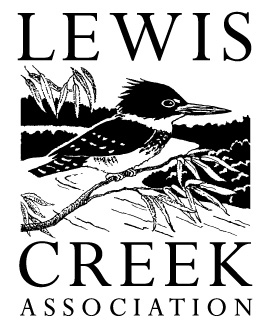Non-native invasive plant species have long threatened the health of ecosystems, wildlife habitat, and populations of native plants in the Lewis Creek watershed. Management can be difficult because they are easily spread via seeds, roots, fragments, animals, and humans.
Japanese knotweed can be a particularly tough plant to remove. It was introduced from East Asia in the late 1800s, and was planted as an ornamental and for erosion control (but ironically, can actually increase streambank erosion). It spreads primarily by its roots/rhizomes, which can break off during a flood then resprout and form a new colony downstream. LCA hopes to engage the community to undertake a long-term project controlling knotweed (without herbicides) in our watershed, and we need your help!
Japanese knotweed on the bank of Lewis Creek in Starksboro. Photo credit: Kate Kelly
A prior grant to LCA documented that knotweed is present in the Lewis Creek watershed, but with a patchy distribution, and that it has not yet spread prevalently across streambanks (unlike in many other Vermont watersheds where it covers nearly every space along streambanks!). LCA is excited to demonstrate a non-chemical removal method to the public at a site in North Ferrisburgh, where our technicians will be present weekly to lead removal efforts, and to display these methods to the public (who can help if they wish!). LCA is partnering with Mike Bald (Got Weeds?) to guide this work and demonstrate effective methods for knotweed removal without herbicides – it can be done!! You can also get involved in a project that uses community scientists to help us understand the distribution of knotweed in the watershed using iNaturalist. LCA would love to have your involvement in one or both portions of the project. If you’re interested in learning more, sign up at https://bit.ly/lca-knotweed, attend our event on May 5, 2-4 PM, at Cota Field in Starksboro, or reach out to Kate Kelly, Program Manager for Lewis Creek Association, at lewiscreekorg@gmail.com or 488-5203. This work is funded by the Lake Champlain Basin Program/NEIWPCC/US EPA.
This product has been funded wholly or in part by the United States Environmental Protection Agency under Assistance Agreement #00A00707 to NEIWPCC. The contents of this document do not necessarily reflect the views and policies of the U.S. Environmental Protection Agency, nor does the U.S. EPA endorse trade names or recommend the use of any products, services or enterprises mentioned in this document.



